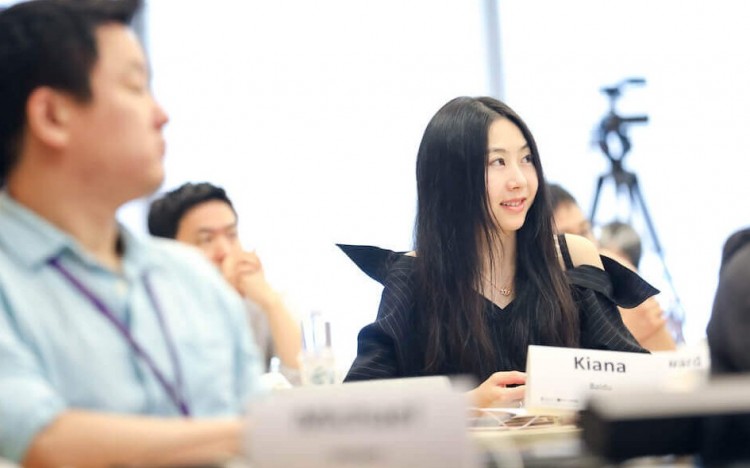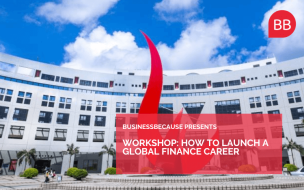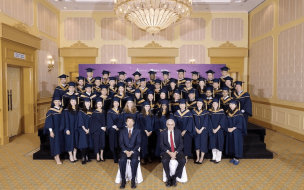Rapid innovation in fintech and an array of opportunities linked to China’s Belt & Road—a massive infrastructure development project extending across the old Silk Road trade route—are creating more opportunities for new jobs and new business.
The HKUST-NYU Stern MS in Global Finance—a part-time, post-experience Master in Finance degree offered by Hong Kong’s HKUST Business School and NYU Stern in New York—offers students a unique insight into China’s financial industry.
The one-year program is divided into seven modules, with classes held in Hong Kong, New York, and Shanghai. Participants are required to have a bachelor’s degree and at least five years of work experience.
HKUST’s knowledge of the Chinese market means students are exposed to the latest finance trends; they learn about doing business in China and work in teams on real-life financial issues.
We spoke to two MS in Global Finance participants who explain why China is the go-to-place for opportunities in finance and how studying a master’s degree can set you at an advance.
Amazing opportunities—Kiana Shek
Kiana Shek was working for Chinese internet giant Baidu in Beijing when she started thinking about going to business school.
She applied for MBA programs at Stanford and Northwestern University’s Kellogg School of Management in the US. Instead, she ended up joining the HKUST-NYU Stern MS in Global Finance.
Kiana was introduced to financial technology—fintech—through the program, where she realized just how much fintech was disrupting the traditional finance industry.
Kiana saw an opportunity. After graduation, she left Baidu and founded her own company, a blockchain-based cryptocurrency exchange platform, designed to help people transfer digital currency in a more secure, convenient, and transparent way.
“I chose the program, not only because of its depth in finance and the two reputable business schools, but also because of its flexibility and the classmates I’d have,” Kiana explains.
“I met a group of smart people with extensive experience in China and there were opportunities to partner on new initiatives.
“With the resources I got from the program, combined with my knowledge in technology and the personal network I built in the US and China, I thought: ‘Why don’t I start my own business before I’m 30?’
“In China, when there is a problem, there is an opportunity to make a difference. China is the present as well as the future for us millennials.”
How a Master in Finance can help—Dominik Franz Josef Weigl
©Dominik Franz Josef Weigl
Dominik Franz Josef Weigl travels in from Germany to attend his Master in Finance classes. In Europe, he co-manages his own company developing and producing high-power flywheel technologies for energy storage.
He previously lived in China, where he project-managed a major M&A transaction between a Swedish manufacturer and a Chinese car producer, overseeing the transfer of around 300 machines from Gothenburg to Beijing.
When considering a Master in Finance program, he knew he wanted to maintain his ties to business in China because of the opportunities that the market presents.
“The fact that the courses where held over long weekends in the most important financial hubs combined with a strong link to China and Asia was particularly appealing,” he says.
The program, Dominik explains, prepares candidates for careers in finance in China in a number of ways.
“Firstly, you get access to a really large and high profile network of experts working in the financial industry, not only in Asia but also globally, often with a strong focus on the Asian markets,” he continues.
“Then, there is a course which takes place in Shanghai, offering in-depth insights into the Chinese financial industry, which is still different from Hong Kong or the Western markets.
“Finally, the course content is very broad and covers a lot of areas within finance, often linked to topics from Asia or China.
“You can choose from topics that are most appealing to you or can best support your career. You also choose your final project which could be tied to something you are working with or related to a financial topic with a focus on China.”
In the MS in Global Finance class of 2019, students have an average age of 34 and an average 11 years of work experience between them. The class is comprised of a mix of people representing 18 nationalities and working for big-name finance companies spread out across the globe.
But, even for experienced professionals, to achieve success in China, understanding the intricacies of the Chinese market is key.
“As Confucius already said, success depends on preparation. You need to know the market you want to work in before getting into it and even eventually investing own money,” Dominik says.
“Understanding the markets and creating a strong network is what business school can help you with the most.”



.png)





